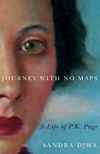Reviews
Nonfiction Review by Anita Lahey
Sandra Djwa, Journey with No Maps: A Life of P. K. Page (Montreal: McGill-Queen’s, 2012). Hardbound, 418 pp., $39.95.

Sandra Djwa’s account of the life of one of Canada’s best poets is as impressively thorough as it is readable. She situates P. K. Page, also an accomplished visual artist, in the wider world so wholly that we see how her times and her sphere resonated in her work—and how that work reverberated outward. Page’s life spanned nearly a century, from 1916 to 2010. To tell her story, Djwa also reconstructs a significant chapter in the cultural history of Canada, an era particularly compelling to revisit through the lens of a poet’s life and mind.
Page’s accomplishments are too numerous to itemize, but to offer a broad sketch: more than thirty books of poetry, essays, travel journals, children’s literature, fiction; a Governor General’s Literary Award for Poetry; paintings collected in the National Gallery of Canada; Commander of the Order of Canada; international acclaim as one of Canada’s preeminent poets. The space between such markers is where the biographer’s work lies, and Djwa has done her duty tenfold, intricately unfolding Page’s rich life through anecdotes, quotes, letter excerpts, and interviews with literally dozens of Page’s contemporaries, relatives, friends, and colleagues. Journey with No Maps offers tantalizing views of P. K. in her world, both external and internal, diligently sketching the circumstances that may have contributed to P. K. the poet and artist. It encompasses a famous yet heretofore untold Canadian love story (that of Page and poet F. R. Scott); cultural portraits of several Canadian cities (because of her father’s military career and her own motion-filled life, Page lived in Calgary, Winnipeg, Saint John, Montreal, Halifax, Ottawa, Victoria); travelogues from Australia, Brazil, and Mexico (where Page and her husband Arthur Irwin lived during his diplomatic postings); a faithful account of a passionate artist’s lifelong effort to hone her crafts and raise her consciousness (Page increasingly embraced the concepts of Sufism through middle age and beyond); a study of the profound changes in the lives of women in the twentieth century; and a welcome peek behind the veil of anonymity usually worn by the biographer. From the opening scene of a sixty-something Page reading in her “resonant voice” from her poem “Ancestors” at Vancouver’s Duthie Books—Djwa unwraps the poem, then deftly segues into Page’s ancestral history—I was caught.
Djwa offers poignant moments from all stages of Page’s life. Among my favourites is a reading at the Eden Mills Writers’ Festival, when a large field of listeners rises to its feet in spontaneous applause for an elderly Page. She hesitates, then waves her cane. We see her during periods when she toils at her arts, and when life gets in the way. We see the importance of lasting friendships with people such as artist Jori Smith, with whom Page corresponded for decades. As a writer myself, I keenly appreciate Djwa’s effort to capture Page’s struggle to find her tribe—those early years in parochial Saint John in particular—and to learn her craft. I also love the moments when she converges with fellow CanLit giants. In 1963, newly settled in Victoria, Page goes to Munro’s Books where Alice Munro is behind the counter, fearing she would faint. “I had read her poetry,” Djwa quotes Munro, “and I could not believe that this person was flesh and blood….” Perhaps more important than all of the well-drawn scenarios, Djwa’s situation of Page’s writings in the context of her life—and her astute analysis of many of Page’s key poems—would (I dare say should) compel any fan to revisit this giant of a poet all over again, to absorb her work with the benefit of new layers of understanding.
One of the marvellous touches in this book is Djwa’s openness regarding her task. She writes how she first meets Page, under what circumstances Page designates her as biographer, and even about the difficulty when her approach butts up against Page’s own vision: “To P. K., a chronological, date and place emphasis indicated that we lived in different universes. Her Boswell wanted to know when she did what. But from the Sufi perspective, all time and events are simultaneous.” These moments of discomfiting honesty are useful in a book suffused with admiration. Djwa makes no bones about her reverence of Page and her work. Her acknowledgement that Page could be difficult— and vulnerable—lend credibility to her voice as biographer, and poignancy to the portrait she’s drawn. This is important because her lack of distance sometimes raises questions. For example, her take on the locally infamous tension between Page and fellow Victoria poet Robin Skelton feels one-sided—one suspects an instinctive protection of her subject at play. That said, in face of Page—whom one imagines, especially after reading this book, as poised, daunting, possibly unforgiving— Djwa generally stuck to her guns and did her job. For this I’m glad. Her frankness gives Page’s own philosophy its due without sacrificing the tenets of solid biography. It’s one thing to lose ourselves in creating, or experiencing, a work of art; it’s another to try to understand how it came to be. And what Djwa describes as the “mundane level” where the biographer’s task begins—a far more mammoth job than that description implies—ought to be respected as highly as the creation of the artwork in the first place. In Journey with No Maps, Djwa has set us sure-footedly on the challenging and invigorating road to fathoming the work of P. K. Page.
—Anita Lahey









